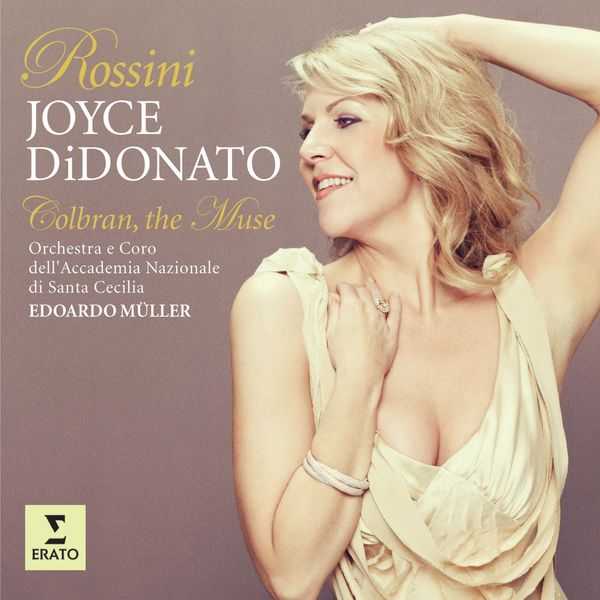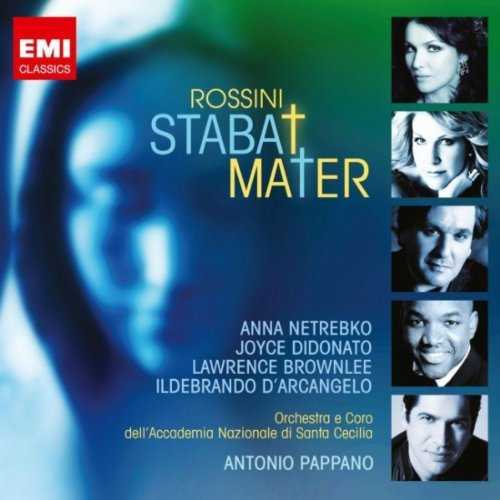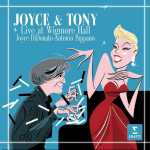
Composer: Gioacchino Antonio Rossini
Performer: Joyce DiDonato, Lawrence Brownlee
Orchestra: Orchestra dell’ Accademia Nazionale di Santa Cecilia
Conductor: Edoardo Müller
Format: FLAC (tracks)
Label: Erato
Catalogue: 6945790
Release: 2009
Size: 278 MB
Recovery: +3%
Scan: cover
01. Armida
02. D’amor al dolce impero
La donna del lago
03. Oh mattutini albori
04. Tanti affetti in tal momento
05. Fra il padre, e fra l’amante
Maometto Secondo
06. Giusto ciel, in tal periglio (Anna)
Elisabetta regina d’Inghilterra
07. Qant’è grato all’alma mia
Semiramide
08. Serena i vaghi rai…. Bel raggio lusinghier
09. Bel raggio lusinghier di speme
Otello
10. Ah! Dagli affanni oppressa
11. Nessun maggior dolore
12. O come infino al core
13. Assisa appiè d’un salice
14. Deh calma, o ciel, nel sonno
Armida
15. Se al mio crudel tormento
16. Dove son io!
17. È ver….gode quest’anima
“A superstar in the Rossini repertory” Chicago Tribune
After the success of her first Virgin Classics recital – Furore, arias by Handel – Joyce DiDonato turns to the composer whose heroines first brought her to international stardom: Gioacchino Rossini.
“Is Joyce DiDonato the world’s best Rossini singer?”, asked the New York magazine Opera News after the American mezzo sang the finale of La Cenerentola at Carnegie Hall in January 2009. “That title certainly seemed hers by sovereign right,” it continued; “Her phrasing was silky, her timbre rich and glowing, and her ornaments were impeccably stylish and utterly beguiling. Most impressive was DiDonato’s combination of immaculate technical control with an air of wild, unstoppable joy. This was truly a moment to treasure from an artist who is at the very top of her game.”
If La Cenerentola does not appear in this new recital, recorded in Rome in June, her other signature Rossini role holds a place of honour: she has been described by the UK’s Sunday Times as “the world’s reigning Rosina in Il barbiere di Siviglia”. In 2009 alone she sings the role in Vienna, London (to be recorded for DVD by Virgin Classics) and New York, and the role has also taken her to Paris, Amsterdam, Tokyo, Houston, San Francisco, Bologna and Rossini’s birthplace, Pesaro.
Rossini’s two best-known comic operas proved essential in building the Kansas-born singer’s reputation over the last decade, but this recital focuses primarily on his serious works – although the tragic tensions do not perhaps run as consistently high as in DiDonato’s first Virgin Classics recital: Furore, the Handel programme released last year and described by The Daily Telegraph as “an exhilarating roller-coaster of a recital from a charismatic singing-actress”.
This Rossini programme includes two arias from La donna del lago, which DiDonato is scheduled to sing over the coming seasons in Geneva, Paris, Milan and London. She takes the role of Elena, written for a soprano, but a great success in the 1980s for DiDonato’s idol, fellow high mezzo Frederica von Stade. The other arias on the CD were also all composed for soprano: they come from Otello, Semiramide, Armida, Maometto II and Elisabetta regina d’Inghilterra. DiDonato proved that she can triumph in music written for soprano with her recent complete recording of Handel’s Alcina and her debut last year in the role of Mozart’s Donna Elvira; the performances at London’s Royal Opera House prompted The Guardian to describe her as “the real star … singing her first Elvira and nailing even the topmost notes,” while The Daily Telegraph praised her performance in a similar vein: “The star of the show was … Joyce DiDonato, who sang Elvira with a style, sensitivity and bravura that outclassed everyone else on stage.”
To return to Rossini and Rosina, the role for DiDonato’s debut at the Vienna State Opera in April 2009, the Wiener Zeitung had this to say: “She tossed off crystal-clear coloratura, presented a dark, secure low register, a confidently nuanced mid-range, bright and voluminous high notes – in short, everything that makes for great, modern bel canto style. She appears undaunted by the role’s many technically tricky passages, and even more: she sang musically challenging variations on every repeated phrase, shaped every single bar with brio, and presented a psychologically multi-faceted characterisation with wildly joyful abandon.”
Many opera fans are perfectly happy to enjoy Rossini’s operas without ever visiting the facts of his personal life beyond that which can be read in a program booklet. As the old saying goes, however, behind every great man there is a woman, and in Rossini’s case it was Spanish diva Isabella Colbran, whom he worshiped from afar before the two became an item around 1817 — he was 25, she 32 — and subsequently married in 1822. Not long after they married her voice went into sharp decline; this is documented in a number of unflattering reviews from both Italy and London. Nevertheless, this did not occur before Rossini had the chance to write his most challenging and involved roles for her, and this part of his legacy is what is explored on Virgin Classics’ Colbran, the Muse.
Mezzo-soprano Joyce DiDonato is not your ordinary diva; mere months before Virgin Classics’ Colbran, the Muse was released, DiDonato made the headlines when she broke her leg during a performance of Il Barbiere di Siviglia, yet finished the performance on crutches. This helped cement DiDonato’s reputation as a trouper, but it is the diva — not the trouper — that we hear on Colbran, the Muse. While recording companies do not routinely concern themselves with exploring the legacies of singers no one can reasonably hear, to her credit DiDonato takes this project quite seriously and does her best to channel Colbran through music Rossini wrote for her. There is some controversy as to whether Colbran was a soprano or a mezzo; however, there certainly isn’t anything in her music that DiDonato can’t handle; moreover, she does so not only with accuracy and respect for the model but also with no small amount of sheer star power and charisma. Rossini tends to be less harder on the orchestra than on singers, and this can lead to a certain underpowered “house style” with Rossini, especially in Italy. Not so here, as Edoardo Müller and the Orchestra dell’Accademia Nazionale di Santa Cecilia approach every bar of their music with attentive dedication and a scrupulous sense of ensemble dynamics. Likewise, the chorus doesn’t sound like it’s in the next province, yet never covers the star of the show and is well drilled by Müller.
Virgin Classics’ Colbran, the Muse is a terrific star turn for DiDonato and an especially fine tribute to an artist whose voice gave way more than 50 years before Thomas Edison developed the technological means to capture it. This quirky idea succeeds so well that opera fans might regard it as a privilege.



